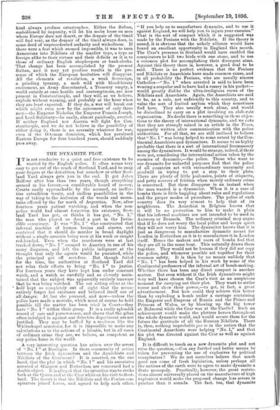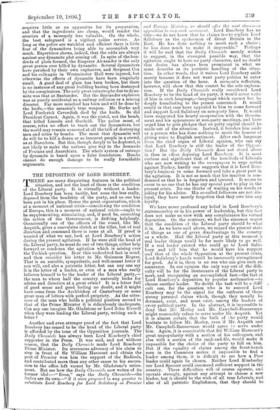THE DYNAMITE PLOT.
IT is not conducive to a quiet and free existence to be wanted by the English police. It often seems very easy to get out of the reach of Scotland Yard, and to snap your fingers at the detectives, but somehow or other Scot- land Yard always gets you in the end. It got Jabez Balfour after less than two years, though everything seemed in his favour,—a considerable hoard of money, Courts easily approachable by the accused, an ineffec- tive extradition treaty, and endless possibilities in the way of taking to the seclusion of the woods and moun- tains offered by the far north of Argentina. Now, after fourteen years patient watching, and when the non- police world had almost forgotten his existence, Scot- land Yard has got, or thinks it has got, " No. 1," the man who played so dread a part in the Invin- cible conspiracy. It was "No. 1" who constructed that infernal machine of human brains and sinews, and contrived that it should do murder in broad daylight without a single assassin being seen at his work or caught red-handed. Even when the murderers were at last tracked down, " No. 1" escaped to America in one of his many disguises, and left the public indignant at the thought that only the agents would be punished, while the principal got off scot-free. But though foiled for the time, the authorities at Scotland Yard did not relax their efforts to bring "No. 1" to justice. For fourteen years they have kept him under constant watch, and a watch so carefully and so cleverly main- tained that the subject was apparently entirely unaware that he was being watched. The cat sitting silent at the hold kept so completely out of sight that the mouse entirely forgot her existence and believed itself out of all danger. At last she pounced, and now—unless the police have made a mistake, which must of course be held possible till the matter has been tried in Court—they have " No. 1" within their grasp. It is a really splendid record of care and perseverance, and shows that the gibes often indulged in against our detective department are not justified. They may be baffled by a madman like the Whitechapel murderer, for it is impossible to make any calculations as to the actions of a lunatic, but in all cases of ordinary crime they are, we believe, as competent as any police force in the world.
A very interesting question has arisen over the arrest of "No. 1" at Boulogne. Is there community of action between the Irish dynamiters and the Anarchists and Nihilists of the Continent ? It is asserted, on the one hand, that the plot in which " No. 1" and his associates arrested at Glasgow and Rotterdam are concerned had a double object. It is alleged that the intention was to strike both at the Queen and at the Czar while on his visit to Scot- land. The theory is that the Nihilists and the Fenian con- spirators joined forces, and agreed to help each other. " If you help us to manufacture dynamite, and to use it. against England, we will help you to injure your enemies." That is the sort of compact which it is suggested was made by the Fenians with the Nihilists. If the theory is sound, it is obvious that the unholy alliance would have found an excellent opportunity in England this month. The Czar's presence in Scotland would have enabled the conspirators to kill two birds with one stone, and to use a common plot for accomplishing their divergent aims. Against this theory there is, however, a good deal to be said. There is no perfect evidence that the Fenians and Nihilists or Anarchists have made common cause, and in all probability the Fenians, who are usually sincere Catholics—" No. 1" when arrested is said to have been wearing a scapular and to have had a rosary in his pocket— would greatly dislike the ultra-irreligious views of the Nihilists and Anarchists. Again, the Anarchists are said to be, as a rule, not unfriendly to this country, and to value the sort of limited asylum which they sometimes find here. They also usually work alone, and would be disinclined to carry on a plot involving an elaborate organisation. No doubt there is something in these objec- tions to the theory of international dynamite, and we note that they are strongly raised in an article in the Times, apparently written after communication with the police authorities. For all that, we are still inclined to believe that " No.1" was being helped to some extent by the Con- tinental Anarchists and dynamiters. It seems to us highly probable that there is a sort of international freemasonry among the dynamiters. It would be strange, indeed, if there were not, considering the international action taken by the enemies of dynamite,—the police. Those who want to use dynamite for unlawful purposes find that the police of all countries act with extraordinary unanimity and goodwill in trying to put a stop to their plots. There are plenty of little jealousies, points of etiquette, and petty sources of friction when merely ordinary crime is concerned. But these disappear in an instant when the man wanted is a dynamiter. When it is a case of bombs there is little haggling about rules and regulations and the proper modes of procedure. The police of each country does its very utmost to help that of its neighbours. The Anarchist in Belgium knows that it will be no protection to him to make it plain that his infernal machines are not intended to be used in Antwerp or Brussels. The ordinary criminal may argue that if he does not worry the local police and keeps quiet they will not worry him. The dynamiter knows that it is just as dangerous to manufacture dynamite meant for London in Rotterdam as it is to manufacture it in London itself. Hence the makers and users of bombs feel that they are all in the same boat. This naturally draws them together. They would not be human if they did not copy the police, and whenever possible act together for their common safety. It is then by no means unlikely that " No. 1" has been helped in his work by some of the Continental professors of the infernal art of bomb-making. Whether there has been any direct compact is another matter. But even without it the Irish dynamiters might very well have chosen the Czar's visit as an auspicious moment for carrying out their plot. They want to strike terror and show their power,—to get, in fact, a great advertisement. But how could they achieve this better than by exploding a bomb under a carriage containing the Emperor and Empress of Russia and the Prince and Princess of Wales, or by blowing up the big tower at Balmoral while the Czar was at the Castle? Such an achievement would make the plotters heroes throughout the whole dynamite world, and would secure them for the future the gratitude of all the Russian Nihilists. There is, then, nothing improbable per se in the notion that the Continental Anarchists were helping "No. ]," and that his plot was directed against the Czar as well as against England.
It is difficult to touch on a new dynamite plot and not raise the question,—Can any further and better means be taken for preventing the use of explosives by political conspirators ? We do not ourselves believe that much good can come of fresh legislation, unless perhaps all the nations of the earth were to agree to make dynamite a State monopoly. Practically, however, the great restric- tions almost universally placed on the manufacture of high explosives would make the proposed change less severe in practice than it sounds. The fact, too, that dynamite requires little or no apparatus for its preparation, and that the ingredients are cheap, would render the creation of a monopoly less valuable. On the whole, the best safeguard is a vigilant police service. As long as the police are watchful and efficient there is little fear of the dynamiters being able to accomplish very much. Experience shows, indeed, that the odds are always against any dynamite plot coming off. In spite of the hun- dreds of plots formed, the Emperor Alexander is the only great person ever killed by dynamite. Several dynamiters have perished by their own explosives, and Sergeant Cox and his colleague in Westminster Hall were injured, but otherwise the effects of dynamite have been singularly small. A good deal of glass has been broken, but there is no instance of any great building having been destroyed by the conspirators. The only great catastrophe due to dyna- mite was that at Santander. But the Santander explosion was as purely accidental as a railway collision or a mining disaster. Far more mischief has been and will be done by the knife,—the assassin's true weapon. Mr. Burke and Lord Frederick Cavendish died by the knife. So did President Carnot. Again, it was the pistol, not the bomb, that killed Lincoln and Garfield. The police must, of course, relax no effort to track out the dynamiters, but the world may remain unmoved at all the talk of destroying men and cities by bombs. The most that dynamite will do will be to kill a dozen or so innocent people in a crowd, as at Barcelona. But this, though deeply to be deplored, is not likely to make the nations give way to the demands of Fenians and Anarchists. The whole system of outrage by dynamite is based upon a false foundation. Bombs cannot do enough damage to be really formidable arguments.



































 Previous page
Previous page